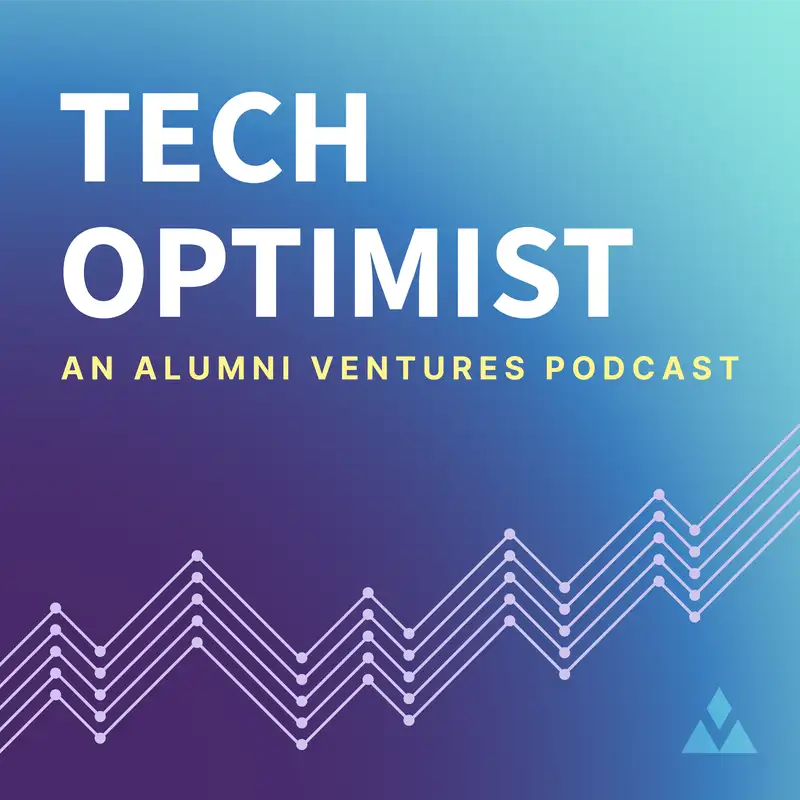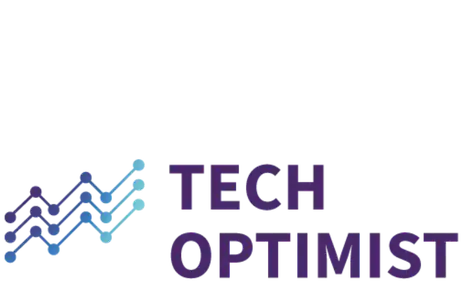#49 - Meet the Startup Building Secure Data Warehouses for Our Ever-Changing World
Sam:
Today we talk with the co-founder and CEO of a decentralized data warehouse. What does that mean? Let's find out.
Nate Holiday:
I think as you look at this world that we're moving into, you need to be able to verify and you need to have transparency across that database operation. You can't just allow an AI agent to have access to your bank account. You can't allow them to have access to your credit cards. Put it simply, we ensure that anything that is operating in a database can't be manipulated and that you have transparency and verifiability for that application that it's running on.
Sam:
Hello everyone. Welcome back to this episode of the Tech Optimist: Meet the Startup. Today we meet Space and Time, a company that provides a decentralized data warehouse. Now first, the voices that you're going to hear in this episode are for Ray Wu. He is the AV guide for our guest today. Ray Wu is a managing partner at Alumni Ventures for the AI fund. And then our guest today is Nate Holiday, CEO and co-founder at Space and Time. And then of course you'll hear me. My name is Sam and I am the tech note writer and narrative sculptor for this podcast.
A little bit about what this episode is mostly about today. Space and Time, as I said earlier, is a decentralized data warehouse. Data warehouses are where businesses are processing all of their data in order to interact with their consumers more regularly.
As a reminder, the Tech Optimist podcast is for the informational purposes only. It's not personalized advice and it's not an offer to buy or sell securities. For additional important details, please see the text description accompanying this episode.
Ray Wu:
Hi, my name's Ray Wu, managing partner at Alumni Ventures. Today I'm speaking with Nate, the CEO and the founder of Space and Time. We're excited to be part of Space and Time's current funding round and to embark on this journey together. Nate, before we dive into the product details here, please introduce yourself and your company.
Nate Holiday:
Absolutely, Ray, thanks for having me on. Like Ray mentioned, I'm co-founder and CEO for Space and Time. I spent over a decade in the database and data warehousing industry working at companies like Teradata Corporation based out of San Diego, which is a large scale enterprise data warehousing company that's publicly traded, spent a lot of time within the ETL management tools within the industry as well. And Space and Time is a next generation data warehouse. It's a decentralized data warehouse built for the blockchain to ensure that we can verify applications, that we can verify data that is being processed in database to ensure that the manipulation hasn't occurred within a database as it is connecting to a smart contract or an AI agent or an autonomous business process, whether it's an enterprise application or a DeFi protocol, etc. You can think of Space and Time as this verifiable compute layer for AI and blockchain.
We built a decentralized data warehouse which comes preloaded with indexed blockchain data from major chains and allows developers to join it with their own on-chain and off-chain data sets. And really one of the core technologies is this concept called Proof of SQL. It's the first sub-second ZK co-processor and enables developers to ZK prove their query results in Space and Time in order to facilitate sophisticated and data driven smart contracts and verifiable AI. Put it simply, we ensure that anything that is operating in a database can't be manipulated and that you have transparency and verifiability for that application that it's running on.
Sam:
As always, you guys know my MO when I'm making these episodes. I did a quick deep dive on Space and Time's website. As always, and on there about page, I found a YouTube video that again, Space and Time is invested in and has spent the time animating it and really having concise verbiage on their company, how they operate and their mission and value systems. I'm going to play that now because I think that Nate's company, Space and Time, what they do is a pretty complex thing that some people that are listening to the show may not know about. First off, we're going to play this video that really is concise and clear about what their technology is and how it works. Here is that now and enjoy.
Speaker 4:
Digital automation brought the world's business logic online in centralized systems that required brand trust from its customers. Smart contracts have ushered in a new generation and business logic automation that operates with cryptographic guarantees. However, due to inherent limitations in storage and compute of blockchains, business logic has only just begun to be written into smart contracts. Adoption requires familiar tools that allow enterprises and dApp developers to bridge blockchain technology with centrally controlled databases and complex business logic. Doing so requires space and time processing both transactions and analytics in a single trustless environment, connecting data and business logic to and from major blockchains. We are partnering with the technology leaders of today's logic and tomorrow's automation to power the next wave of smart contract adoption in automating the business logic of the world.
Ray Wu:
That's one thing I love about what you have done in technology, because I think it's really essential to have that verifications and trust abilities on the data set, not only on the computing, but also have the belief that whatever is in the data actually can be trusted and not altered. That's just wonderful in terms of what you've built. What inspired you to start this venture? Were there any industry catalysts or trend that influenced your decision?
Nate Holiday:
It is a good question. Back in 2021, I started doing strategic advisory work for Chainlink. And one of the things that we were working on is how do you drive enterprise adoption? How do you drive enterprise data capabilities using blockchain and smart contract capabilities? And one of the things that became very prevalent and something that we started to realize is most smart contracts, most applications within the Web3 and decentralized application industry were being run on centralized database services. We realized that this world of decentralized applications really were centralized from a database processing perspective. And unfortunately smart contracts, they're limited in size of processing and they can't process a lot of data and they're very, very slow at processing. And the challenge is how do you have a decentralized application that needs a tremendous amount of data to be verifiable so it can operate in combination with a blockchain to have truly decentralized application, truly verifiable in database processes?
And this is really the genesis of Space and Time. We looked at this and we thought, "Today on the market there is not a database that can be verified that can run large scale enterprise applications." And although smart contracts were the first focus of building Space and Time, this verifiable application process really applies across any industry. We're starting to see the evolution of AI agents. Everyone realizes that AI agents are transacting autonomously without human intervention, just like smart contracts operate autonomously without human intervention.
And I think as you look at this world that we're moving into, you need to be able to verify and you need to have transparency across that database operation. You can't just allow an AI agent to have access to your bank account. You can't allow them to have access to your credit cards. And this has to start to operate in a way that is verifiable and transparent. And today, unfortunately, without Space and Time, all of these database processes are centralized. They can be manipulated, they can be tampered with. You really can't trust a database to operate an AI agent or to operate a smart contract or to really operate any enterprise application in the world because of the security and lack of transparency within them.
Ray Wu:
Absolutely. It's so important, especially with AI when it's all about creativities. How do we know what to trust? This trust layers where you're building out as essential in terms of decentralized, doesn't matter it's centralized, decentralized, but for decentralized AI definitely is one of the core components to make it happen.
Sam:
Hey everyone, just taking a quick break so I can tell you about the AI fund from Alumni Ventures. Alumni Ventures is one of the only VC firms focused on making venture capital accessible to individual investors like you. In fact, Alumni Ventures is one of the most active and highly rated VC in the US, and we co-invest alongside renowned lead investors. With our AI fund, you'll have the opportunity to invest in a portfolio built entirely around advancements in AI. This fund consists of 15 to 20 investments in multiple fields where AI is making a huge impact, including areas such as machine learning, healthcare, education, transportation, and more. To get started, visit us at av.vc\funds\AIfund. Now back to the show.
Ray Wu:
Can you share where you are in term of product development and customer acquisition?
Nate Holiday:
Yeah, our database that we created, the decentralized data warehouse is generally available. We have over a half a million queries operating on the system through consumer and customer applications on a monthly basis. We have over 5 billion records being written to the database on a monthly basis. We just crossed four and a half million dollars of ARR within our first 12 months of our beta launch, which was last May at the Consensus Conference, we kicked off beta. We've now launched Proof of SQL. Proof of SQL, think of it as a zk-SNARK for verifying in database processing. The challenge in the past with zk-SNARKs in database processing is that is very, very expensive and that is very, very slow. The exciting thing that we have accomplished with Proof of SQL, which is the marketing term we use for this in database ZK verification process, is we can operate basically a million plus rows of ZK verification in less than a couple seconds. We can sub-second verify a hundred thousand row tables in database using Proof of SQL on Space and Time.
Sam:
Really quick I'm going to add in here and help define what ZK verification is. For those who don't know, like me, I didn't know what it was, I'm here to educate everyone so we're all on the same page when we're talking about this. Zero knowledge verification refers to a cryptographic method that allows one party, the prover, to prove to another party, the verifier, that a statement is true without revealing any information beyond the validity of the statement itself. The core concept is ZK verification enables proving knowledge about data without disclosing the actual data and maintains privacy while providing certainty about the truthfulness of a claim. Some properties on this, completeness, an honest prover can convince an honest verifier of a true statement. Soundness, a dishonest prover cannot convince an honest verifier of a false statement.
Zero knowledge, the verifier learns nothing beyond the validity of the statement. Some applications for this, ZK verification has numerous applications across many fields, including cryptocurrency authentication, electronic voting, and even secure data transfers. In crypto, it enhances the transaction privacy. In authentication, it proves identity and without revealing personal information, that sounds like an oxymoron, doesn't it? It does a little bit. Electronic voting, it can ensure vote validity while maintaining voter privacy. And then in securing data transfers, it verifies computations on private data without exposing the data itself. And just some general benefits to this, it improves privacy in digital interactions, it enhances security and authentication processes and it can be scaled easily. Scalability solutions for blockchain networks such as Ethereum.
Nate Holiday:
I think the other exciting thing that we've been able to do, and we're working with Google and Microsoft and others on this is Proof of SQL can be embedded into any database for ZK verification. Think of Proof of SQL as the verification of SQL independent of what database you're using. We did an announcement last year of integrating Proof of SQL with Google BigQuery, and we also announced last year the work that we've started with Microsoft across Microsoft Fabric for in database SQL verification. And the reason that that's important is what you just said earlier, Ray, which is there are reasons that you want to have a decentralized database for processing, but there's a lot more reasons why you just want any database that's running any database process to be verified, independent of whether it's decentralized or centralized. And for us, it's a pretty exciting world because we see a future where we can verify any SQL database processing using Proof of SQL as an embedded protocol within that database.
Sam:
Pause. We're going to take a quick break here for an ad and then we're going to hop right back into the interview.
Speaker 5:
Do you have a venture capital portfolio of cutting edge startups? Without one, you could be missing out on enormous value creation and a more diversified personal portfolio. Alumni Ventures ranked a top-twenty VC firm by CB Insights is the leading VC firm for individual investors. Believe in investing in innovation. Visit av.vc.com to get started.
Ray Wu:
Could you share some details about your latest funding round?
Nate Holiday:
Yeah, we're really excited to have our Series A closed and the announcement of our Series A funding round. We're grateful for alumni and for their support. We raised $20 million in our funding round for our Series A investment. And it's exciting for us because it allows us to really expand on the customer adoption. It allows us to go out and build faster database processing protocols. It helps us go and accelerate the adoption of Proof of SQL within database processing across our customer base.
And really to date, we really haven't spent money on business development and marketing. The growth that we have had has been in a beta, pre-GA release, and we're incredibly grateful for all the customer support and the adoption we've had. But at this point, with our Series A funding, it really allows us to go out and put a lot of effort into customer adoption, put a lot of effort into making sure that our message is understood not just by blockchain and blockchain-adjacent companies and not just AI companies, but really any enterprise that's running an application to ensure that they have the ability to have the added measure of visibility, the added measure of transparency and the added measure of security because it really is a security protocol, ensuring that you can actually verify and ensure that the actual tamper-proofing of that database is secure for your users and for your corporation.
Ray Wu:
Indeed. Now you are looking at obviously working on business development. Do you have any requests for our Alumni Venture committee and how can we help you?
Nate Holiday:
Yeah, for us it's obviously the first one is join our community. We have a community of developers and builders. If you're out there building on a database that's not verifiable, that's not transparent, we would ask you to come look at Space and Time. We have a fantastic community across Discord, across the X platform, across LinkedIn. And then we have a huge community within our GitHub and we ask a lot of what we're building is out there in the open source. We have a GPU accelerator, we have Proof of SQL, we have our database operations all on GitHub as well. You can come and build with us, you can develop with us, you can improve what we're doing alongside our open source community. If you're using a database today and you want to look at something that's more secure and verifiable, there's easy ways to do that.
You can consume it through Microsoft's Azure marketplace, you can consume it through Google's marketplace, you can consume it directly through app.spaceandtime.ai. And I think the next one really is help us to really amplify this message of a verifiable database in a verifiable compute layer for enterprise applications, for AI agents and for Web3 applications. I think most people, when they hear it, they understand it's needed, but it's a concept that I think a lot of people just assume works. They assume that the databases that are running the applications that they use every day are never going to get hacked. They assume that the data on those databases are safe. They assume that companies that have 50,000 employees are always going to be good actors and not bad actors. They assume that these companies with large scale security and infrastructure organizations are doing everything they can to protect their data.
And in many cases, they are. Our message is very simple though. The databases that are operating applications today are tamperable, they can be manipulated, they can be changed. And why would you run a database operation that can be manipulated and tampered with when you have the ability to run a tamper-proof ZK-backed for the exact same price or cheaper than the market leaders within the cloud industry today? For us, it just makes sense. But I think we sit in this world every day and we think about this, I think for the average CIO, the average CTO, I think for the average user, you don't think about, "Is my database verifiable? Is it transparent? Does it run zk-SNARKS in database and does it have the cryptography for security and protection?"
Because these are new concepts. We just see a world in 10 years that it will sound very foreign for a CEO, a board of directors, a CTO, a CIO, to operate a database that can be manipulated because the risk is too high and the cost is in line with their budgets today that they can provide verifiable database processing. And I think as they look to build applications within corporations, as new businesses and new engineers look to build applications, they can do it for a lot cheaper and in a verified infrastructure with Space and Time where they can't do it anywhere else. I think it's an important message, but I think it's a new message that a lot of people haven't thought about yet today.
Ray Wu:
Indeed, I just think of a new concept like you mentioned, most people get used to what's already available. For them, this is what it is, and you say they treat it as truth and essentially that the infrastructure they can trust. But then you see all the hacks every time. It comes from all the major organizations, doesn't matter from a credit report I keep on getting says, "Something got hacked you should put on to make sure that you actually watch your credit report." I do think there's a lot of things that can be done.
And trust and security is one of the major themes across the IT industry for the longest time, I know as, from mainframe onwards, we've been talking about this kind of things and nobody has a great technology to solve it. But I do think that with decentralized services, with the decentralized blockchain and all technology like ZK you mentioned, all this new technology that enable this verification, transparencies and traceability of data, I think that's just wonderful to have. That's reason we enjoy the opportunity to invest allows you into your companies and hopefully we continue to see the success for what you're doing.
Nate Holiday:
And we're super grateful for all your support. You have a huge community. You're obviously wildly successful in the VC and the venture capital investment community. Just congratulations, I saw the top 20 VCs and investments, and you're always in the top list. We're just grateful for all of your support. And to your point, there's a lot of focus on ensuring that hacking doesn't occur, but there's not a lot of focus on, if they do get access to your database, can they actually manipulate it, change it, and tamper with it? And there's an additional level of that security that we're excited about, but we could talk about the foundational technology and why it's important and why it's unique. But at the end of the day, it just comes down to developers want to build new applications. They want to build applications in a new way within the Web3 community, at the intersection of blockchain and AI.
And they want to be able to generate applications. They want to be able to develop their own economies, and they want to be able to deploy those in their communities. If you look at any successful business in the world today, whether it's a Spotify business or a YouTube business or the Salesforce marketplace, it all comes down to, and even the App Store with Apple, can I develop applications and run a new business? Is there a way to monetize this and win in the economy? And then is there a community that I can deploy to? Are there people that will actually consume this on the platform? And we're pretty excited about what's ahead of us at Space and Time because we think Space and Time checks all three of those boxes.
Ray Wu:
Indeed. It's a great pleasure to have you here with us today and definitely enjoy this conversation.
Nate Holiday:
Thanks so much for having me, Ray.
Sam:
Thanks again for tuning into the Tech Optimist. If you enjoyed this episode, we'd really appreciate it if you'd give us a rating on whichever podcast app you're using and remember to subscribe to keep up with each episode. The Tech Optimist welcomes any questions, comments, or segment suggestions. Please email us at info@techoptimist.vc with any of those and be sure to visit our website at av.vc. As always, key building.








